Poem Lanken (ELMENHORST) 1804 for the wedding BACMEISTER - SCHWARTZKOPF
Description
– See more pictures and excerpts below! –
They bid on handwritten, self-written humorous poem from 1804.
Written and authored by a GC (?) Sprengel to the wedding of the captain of the King's German Legion Lucas Wilhelm Bacmeister (1768–1812), son ofon Johann Georg Bacmeister (1736-1800) and Maria Justina von Koenemann (1737-1777) with Julia Amalia von Schwartzkopf (born 3. March 1781 in Danneberg, died. 17. October 1858 in Aurich), Tdaughter of Georg Heinrich Schwartzkopf, Hanoverian official in Dannenberg and Ratzeburg, and Lucia Dorothea Mackeprang. They were the ones Parents of Georg Heinrich Bacmeister (1807-1890), Minister of the Interior, Culture and Finance as well as Prime Minister of the Kingdom of Hanover.
Bacmeister, also occasionally spelled: Backmeister, Bakmester or Bacmester, is the name of an old German Lower Saxon family from the area around Goslar, Braunschweig and Lüneburg. For centuries it produced numerous well-known personalities, especially in the fields of Protestant theology, medicine and law. The Lower Saxony branches of the family belong to the so-called Pretty Families of the Electorate of Hanover.
Title: Straw wreath sermon held the morning after Mademoiselle Julie Schwarzkopf's union with Captain Bacmeister.
Scope: Title page + 10 pages of poem (22.5 x 18.7 cm).
With some insertions and additions.
Dated Lancken (=Gut Lanken in Lauenburg, today in Elmenhorst / Lauenburg; manor house was built in 1732), 3. April 1804.
The tenant Holst of the Lanken estate was related to the bride by marriage.
A Lieutenant Scheel is mentioned in the poem as a wedding guest.
Excerpts:
"From the beginning of the world, no one on earth has understood: to be happy here alone!
Mr. Great-Papa Adam found it ennuyant here // Before he married Mrs. Even;
It seeks a staff from the ivy, the vine; // To which it faithfully clings and weaves..."
"You are now from the Mamsellen Mitte // Divorced since yesterday, and that is the custom
To wake up the new-born madam, // And to tease her a little wantonly;
I'll take over the prankster, // But just be calm, the man is there..."
"How? - Would he have made any such excesses last night?"
"Oh, don't trust men, // Because this one isn't better than others."
"The cheering and dancing is over now, // The man will soon wrinkle his forehead instead."
"If he loses something, you'll have to look for it // He'll make your effort worthwhile by humming and cursing."
Condition: Without cover; folded, stained and wrinkled. Written on very strong paper. Please also note the pictures at the end of the item description!
At the same time, I am offering some other documents from the Bacmeister family!
Pictures
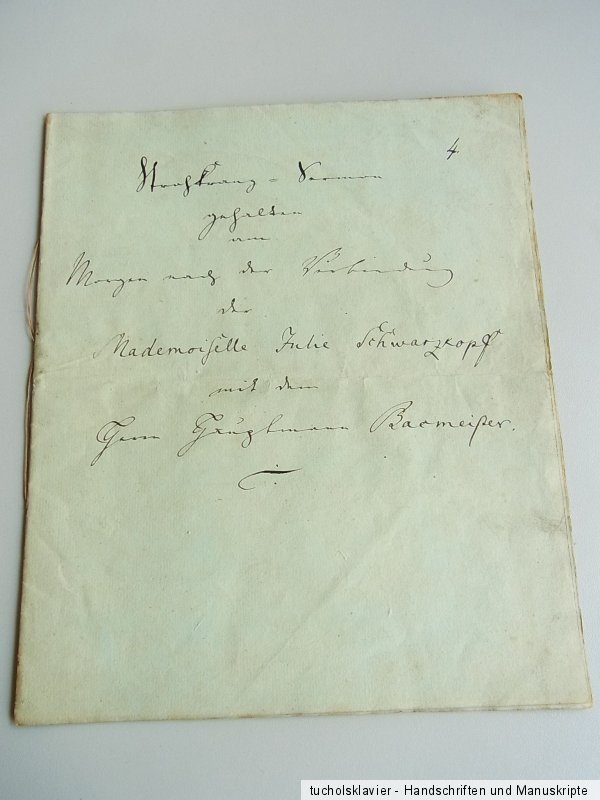
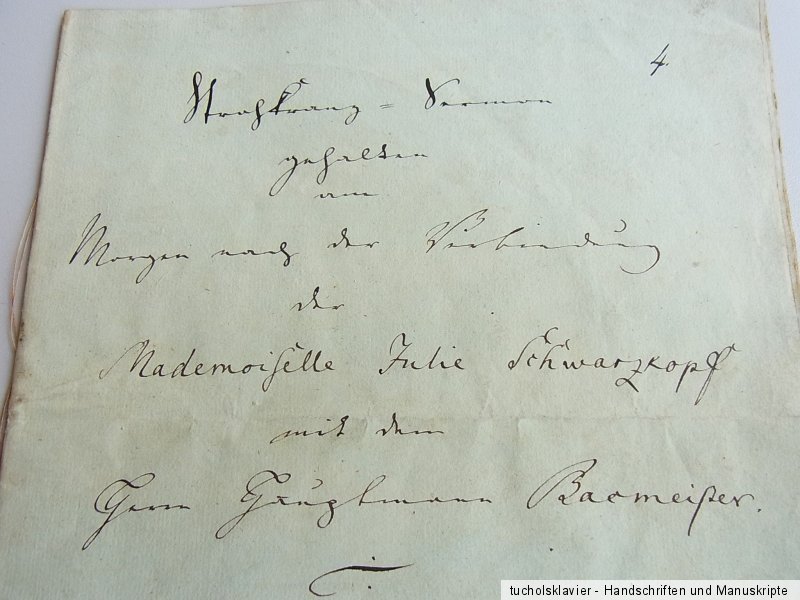
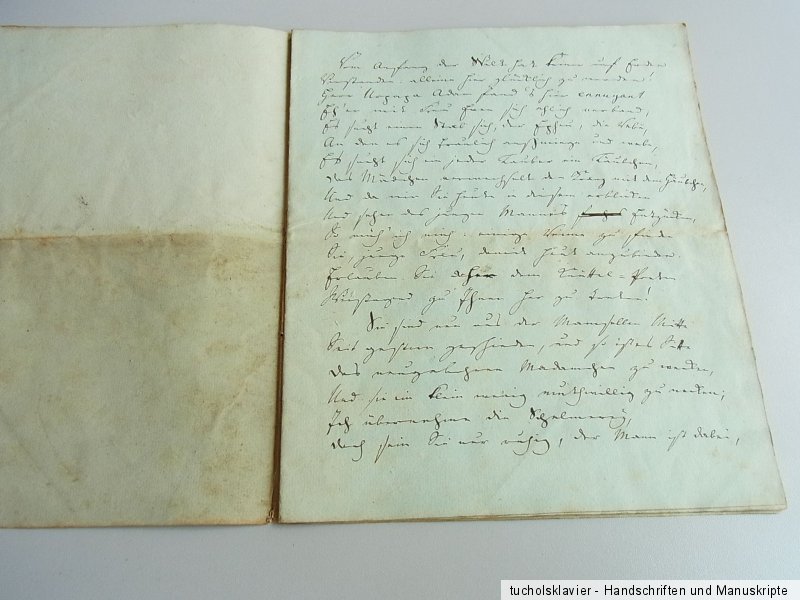
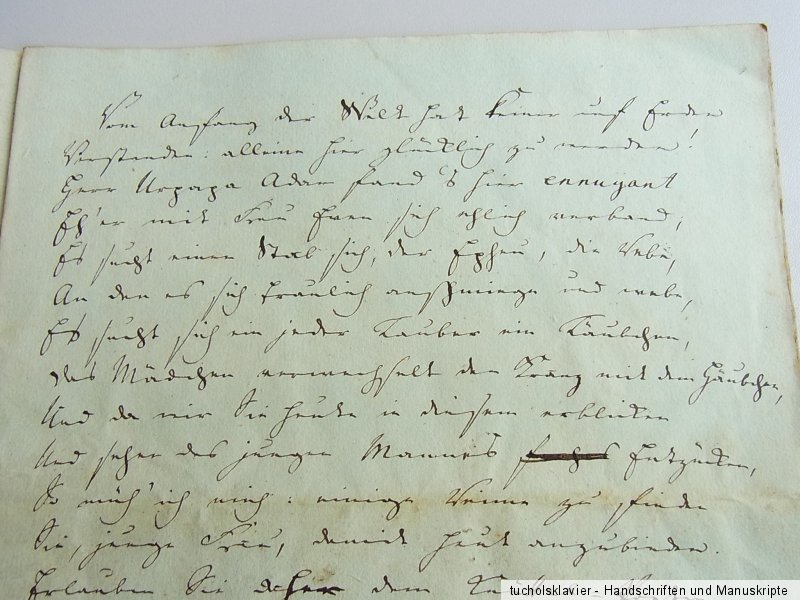
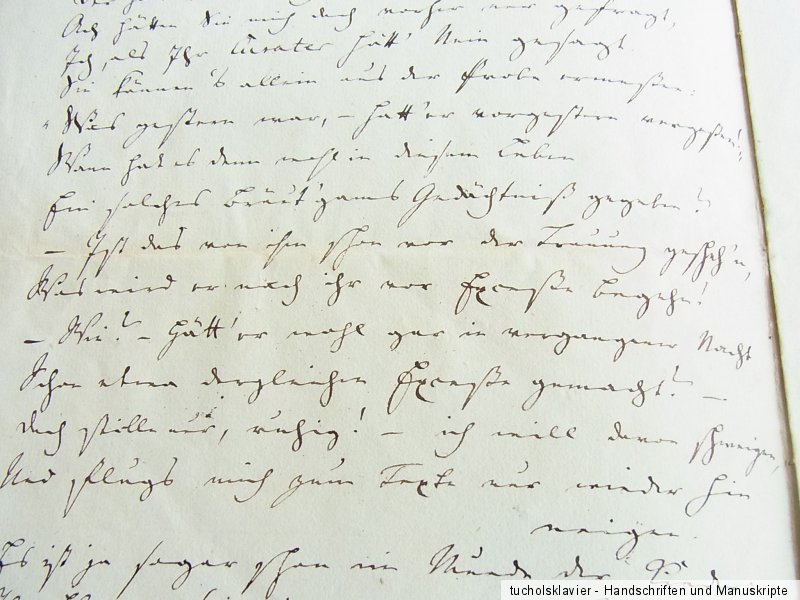
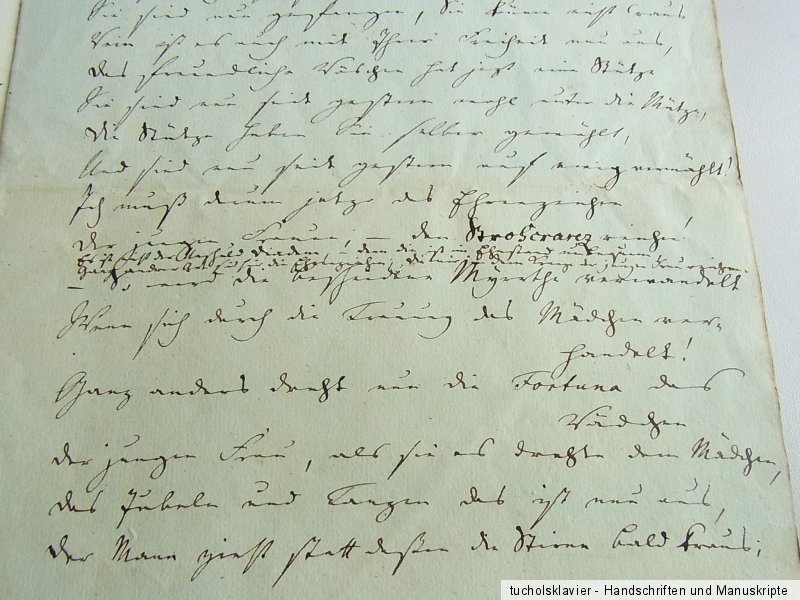
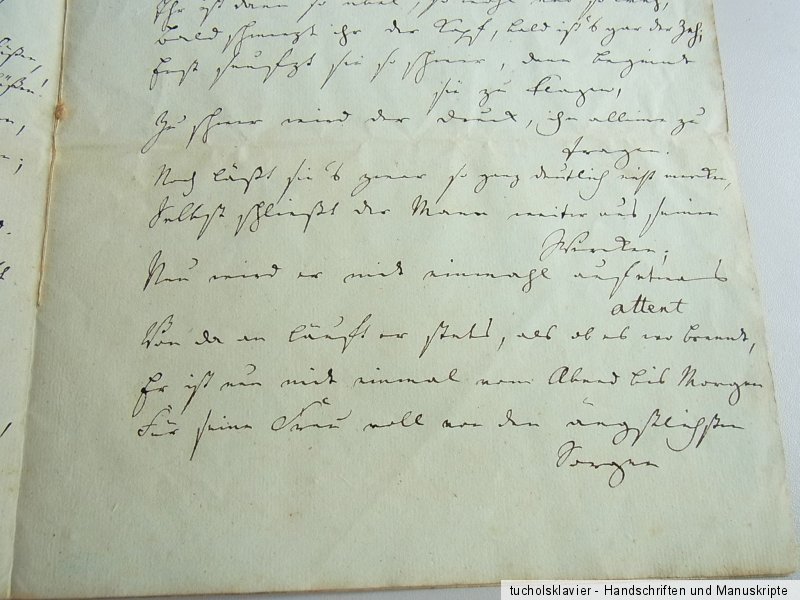
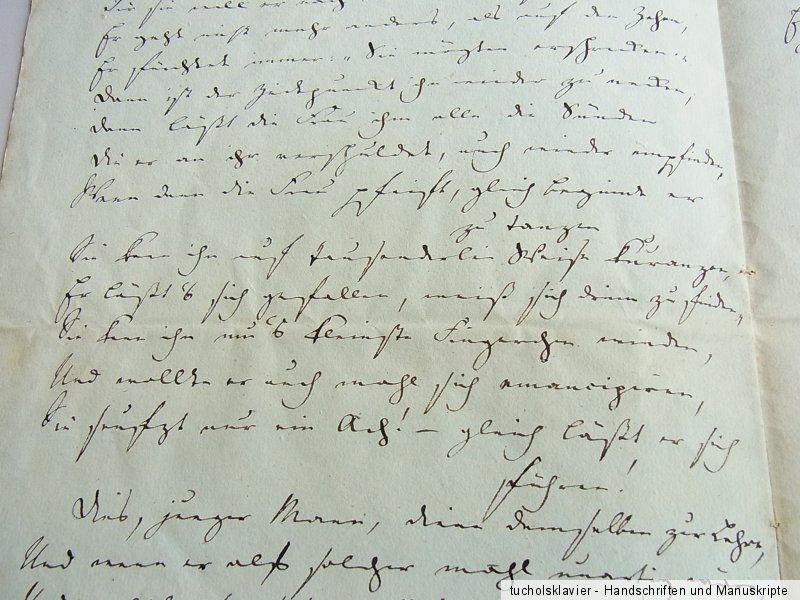
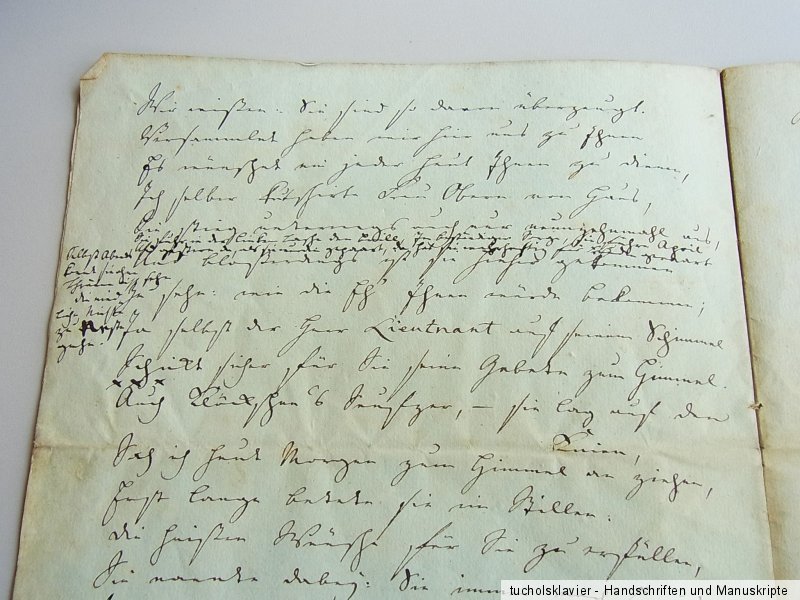
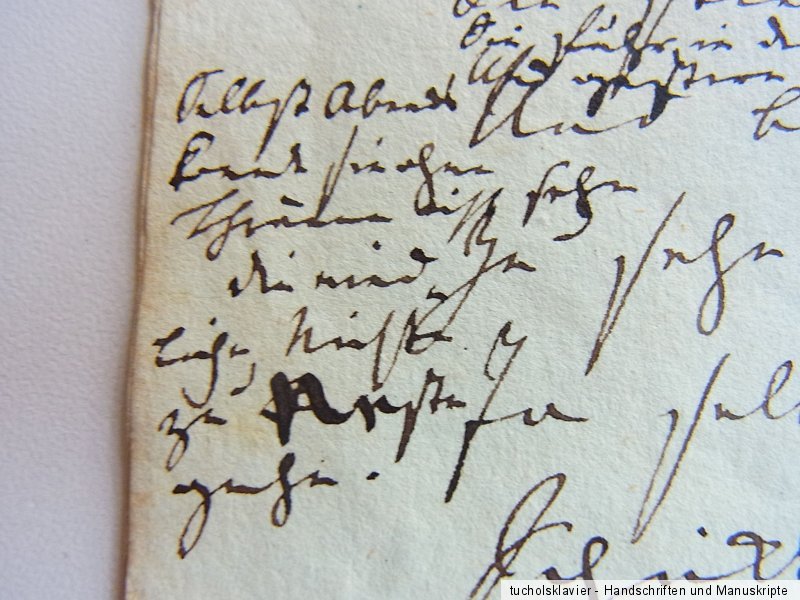
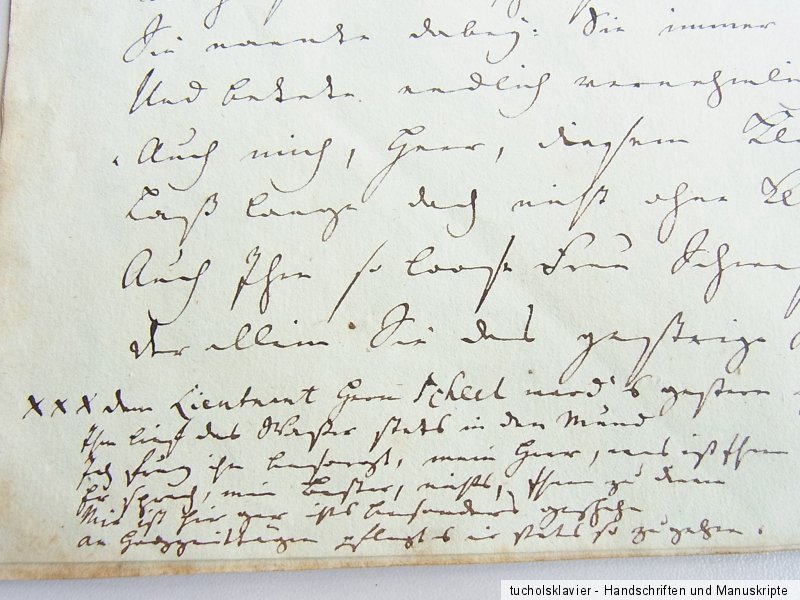
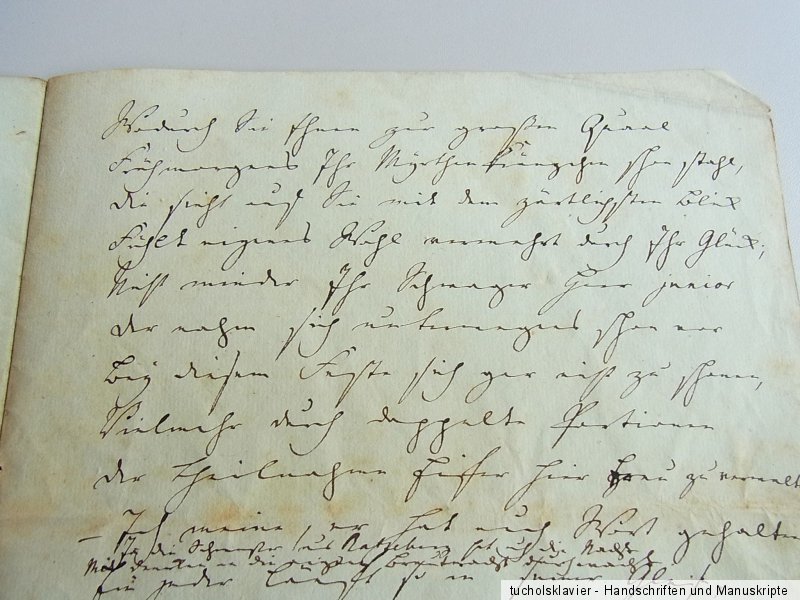
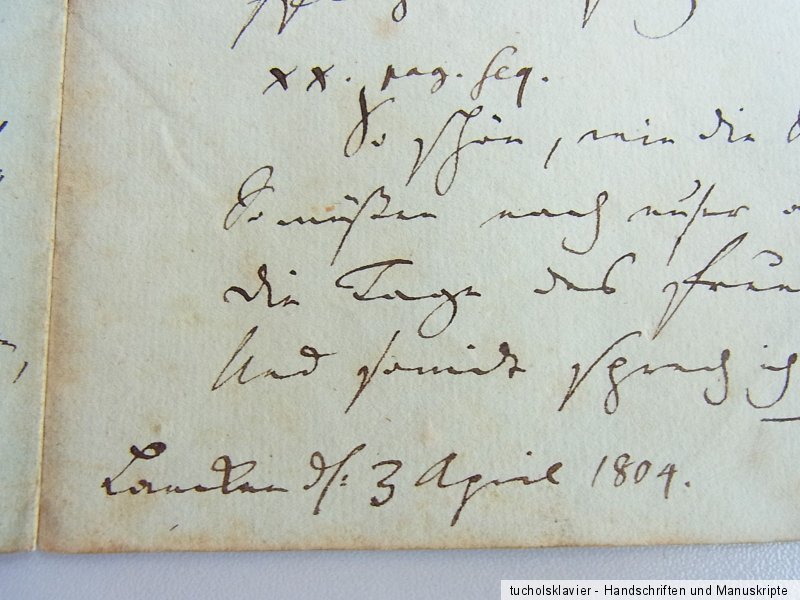
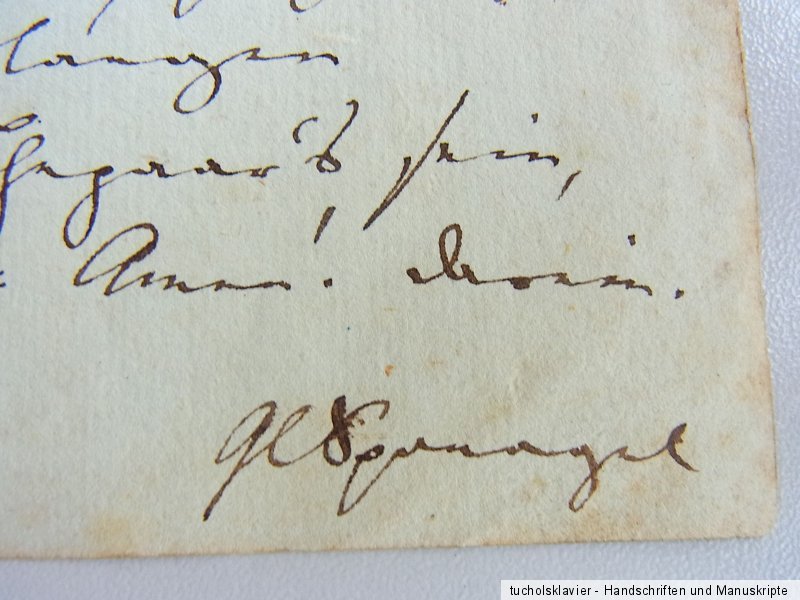
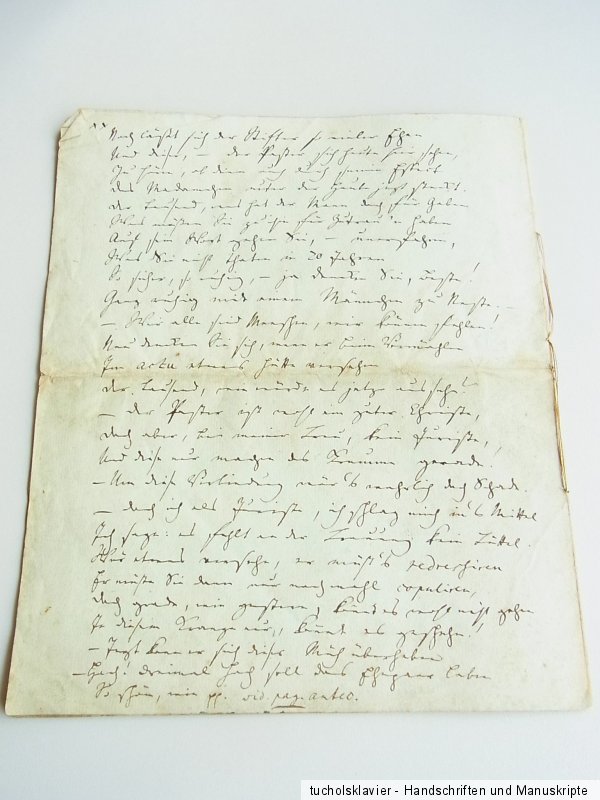
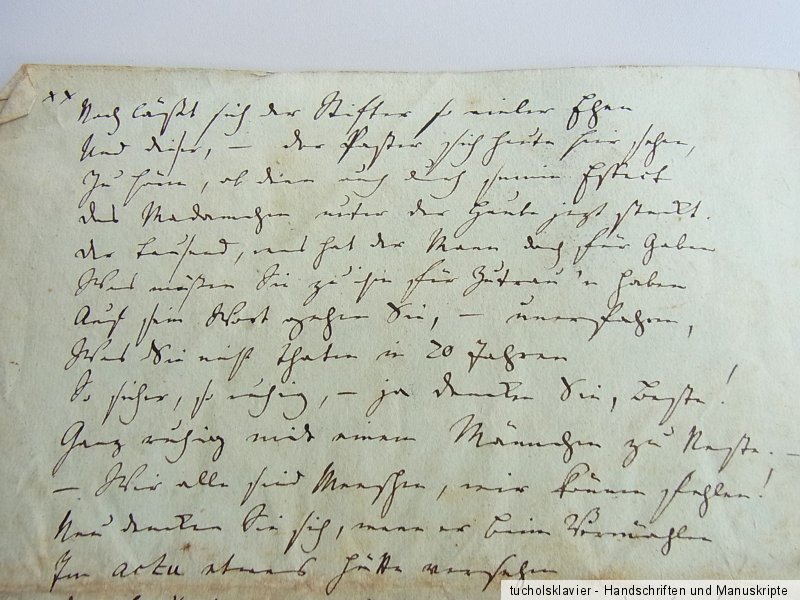
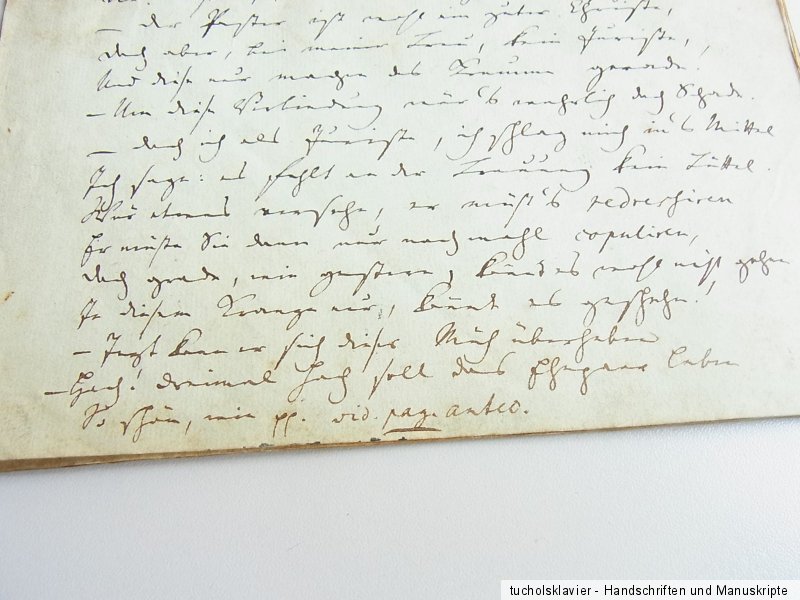
tucholsklavier
About the Bacmeister family (source: wikipedia):
Bacmeister, also occasionally spelled: Backmeister, Bakmester or Bacmester, is the name of an old German Lower Saxon family from the area around Goslar, Braunschweig and Lüneburg. For centuries it produced numerous well-known personalities, especially in the fields of Protestant theology, medicine and law. The Lower Saxony branches of the family belong to the so-called Pretty Families of the Electorate of Hanover.
History: The family name indicates an office that was supposed to ensure the supply of bread; An ancestor was probably the manager of the tithe barn in the Imperial Palace of Goslar. In 1284, a Johann dictus Bacmeister was documented in Goslar, i.e. a citizen of the city who had leased a mill for the city council and no longer held the office. Around 100 documents between 1284 and 1399 identify the dictus bacmeister, partly as heads of the coin guild, partly as councilors in Goslar. The family then emigrated to Braunschweig, where a Hinrik Bacmeister was registered as a master baker at Güldenstrasse 7 between 1407 and 1444. His grandson Ludeke Willm Bacmeister (* approx. After his son Johannes (* before 1500) gained money and honor in the brewery trade in Lüneburg, his son Lucas Bacmeister the Elder was the first in the family to pursue an academic career. In addition, this Lucas Bacmeister is considered the actual progenitor of the family that still exists today and has organized itself into a family association[1].
Since Lucas the Elder moved his workplace to Rostock, where he taught as a professor of theology at the local university, several Württemberg lines emerged from this new Rostock line over the course of the generations, although only the descendants of Chamber Procurator Heinrich Bacmeister still exist, as well as an important Hanover line. From the Württemberg line, a new East Frisian line developed via the princely East Frisian personal physician Eberhard Bacmeister, whose descendants began around the middle of the 18th century. At the turn of the century, most of them moved back to Lower Saxony and some of them later even dared to emigrate to Mexico, where they founded an independent branch of the family. In addition, some important family members held leading positions and positions of responsibility in St. Petersburg and Riga, settled there and also founded new branches of the family.
Today the Mecklenburg line is considered extinct, the Württemberg line - spelled Backmeister - is considered to barely exist, whereas the Lower Saxony and the former East Frisian line (including in Mexico and the USA) are the most strongly represented lines of this family.
The German scholar Adolf Bacmeister wrote summarily about his family in his book Germanische Kleinigkeiten, published in 1870,
“that it gives me a comfortable feeling to be able to trace the history of my family back four hundred years, to observe its changes and migrations, from Lüneburg to the coasts of the North and Baltic Seas, to icy Russia to the vineyards of the Swabian country, and finally even under the palm trees of India on the shores of the Canadian lakes and on the shores of the Pacific. We brewed beer for the people of Lüneburg, gave court sermons to Queen of Denmark Dorothea of Saxe-Lauenburg-Ratzeburg, made ourselves useful as auditors and negotiators under the Swedish flag, preached the gospel to the Hindus in Prakrit, ruled their country for the Dukes of Württemberg, in... Saint Petersburg earned the Order of St. Vladimir and provided the state of Hanover with a minister who helped Admiral Farragut storm the Mississippi….”
About the youth of the son Georg Heinrich Bacmeister:
G.B.'s birthplace is Tullamore (Kings County), a small town in Ireland where his father Wilhelm B. served as captain of the 5th. Lin Battalion of the Royal German Legion temporarily garrisoned with his company. His mother Julia Amalia née. v. Schwartzkopf, who had accompanied his father to England in February 1806 after the unsuccessful expedition of the Anglo-Hanover troops to liberate Hanover from the French, gave birth to Georg B. on February 15, 1807 in a small house that was only imperfectly protected against the rigors of winter. Despite this, the boy thrived thanks to the careful, personal care of his parents, who did not want to entrust him to any of the unreliable Irish guards. At the age of ten weeks he was baptized by the military priest Glünder with the name Georg Friedrich Julius Karl Justus, with the only godfather present being Julius B., a lieutenant in the 5th Lin Battalion, a brother of his father, who officiated at the baptism . But his father was only able to enjoy the family happiness he had enjoyed for a short time, because on April 28th. arrived in England for the 5th Lin. Battalion Embarkation Order in order to be used from there on an expedition to the. Since it was impossible to predict when and whether Wilhelm B. would return to Great Britain, he decided to send his wife and child, whom he did not want to leave to an uncertain fate in a foreign country, back home. After he had taken leave, he accompanied his wife, who had to undertake this very strenuous land and sea journey without having a caretaker for little George, to London, from where they left on June 12th after a stay of a few days. went with the mail to the port of Harwich. Under the protection of one of her husband's comrades, Lieutenant Stoffregen, Julia B. traveled on the parcel carrier Ida to Tönningen on the Holstein coast. When she arrived there, she and her son and the officer continued their journey to Hamburg in a hired vehicle, where they arrived
Favored by a happy coincidence, she met her brother-in-law Holst, tenant of the Lanken estate in Lauenburg, who happened to be there in business, and who took her and her child with him to Lanken. Georg stayed here with his mother, who had stayed with her brother-in-law and sister for years before they got married, until May 1812, then she lived with him, because Holst had given up this lease, until Michaelmas 1812 on the Wotersen estate Tenant Karl was on friendly terms with her. At the instigation of officers she knew, whose husbands also served in the Royal Legion, Julia B. moved with Georg von Wotersen to Stade, where she rented a small apartment from a tax collector in Mörking and stayed in this city until July 1813. In this and the two following years, which were among the most difficult for her and her son due to the constant fear for her husband, who was fighting in distant Spain, his death, and also the worries about food, the latter made up her entire happiness. On him she concentrated the selfless love that a mother alone is capable of, which the boy, who was so understanding beyond his years, sought to repay her with his childlike tender care and unconditional obedience, and without complaint the hardship and grief of the difficult times of war with his mother he carried. Despite all the care and attention she gave him, his life was in danger three times. She herself had the misfortune of overturning a large pot of boiling stock while cooking, the contents of which poured over George, who was standing next to her, and burned him badly; Another time, while playing, he fell down a high cornfloor staircase in Lanken, injuring his left eye. Fortunately, these two accidents and a serious illness that struck him in May 1814 did not cause any lasting damage to his health. In July 1813, mother and son moved to Ratzeburg, where their uncle, a bailiff Mackeprang, whose care Julia B. wanted to dedicate himself to, and her widowed cousin, the bailiff Nanne, lived with their children. On November 22nd Marshal Vandamme appeared in front of Ratzeburg with 40,000 French and Danes and set up camp in front of the city. The rumor soon spread that he would set Ratzeburg on fire when he left, which caused panic among the residents and everyone gave up their most valuable belongings Escape gathered together. But they escaped with sheer terror, because the withdrawing enemies contented themselves with setting fire to the bridge connecting Ratzeburg with St.Georgsberg under the protection of a heavy cannonade in order to secure their retreat from the advancing Allied troops. Prompted by the noise of the battle, Julia B. went outside her uncle's house to see whether the fighters were approaching. Then suddenly a cannonball hit the ground in front of her and, digging into the ground, showered her with sand and stones without causing her any serious damage. After bailiff Mackeprang's recovery, in January 1814 she moved into the small apartment she had previously rented for Georg's sake, in which they both suffered immensely from the terrible winter cold due to the lack of firewood, although they were helped out as best they could by their relatives and acquaintances Due to the heavy snow and lack of suitable vehicles that the requisitioning enemy and friendly troops had taken with them, it was impossible to get the wood that Julia B. had bought in the fall from the forests
to bring about. Under these circumstances, in February 1814 she was happy to be found willing to take over the care of her uncle Mackeprang, who had become ill again, and stayed with him until his death.